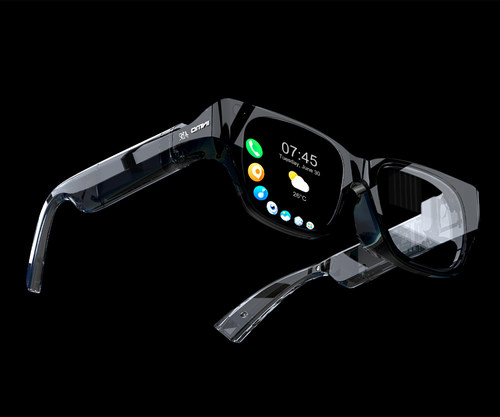Smartphones have become such a central part of our life that it is hard to imagine our existence without them. So far we’ve seen an outstanding evolution and refinement in what our smartphones can do, but will we reach a point in which they become obsolete? If we look at the history of technology, it’s possible that they will be replaced in the future. Futurists are proposing that this will happen with the advancement of augmented reality and 5G technologies. Of course, we could have modern smartphones that could project holograms, but it seems that it will be more efficient and user-friendly to use a technology like smart glasses. These are already emerging and we can expect to see them become popular in the next couple of years. For example, there are rumours that Apple will release their first set of augmented-reality glasses this year (see Apple Glasses: Everything We’ve Heard So Far)
Here is a video that compiles already existing smart glasses. Do you think this could replace smartphones in the future? In what other ways AR could be employed if not through glasses or cellphone holograms? Would this open new doors for remote learning and work?
Looking forward to reading your ideas.

Hi Eduardo:
I too was looking at Smartglasses but you beat me to it. In a May 17th post, Google teased that their smartglasses could do real time translations. That is, subtitles as someone speaks to you, claiming that they can break language barriers. Although this Technology has yet to be released, there’s not much you can say about them but something I am curious to see and will buy if it successfully does as it says. Interestingly, in 2020, Korea made a drama called, “My Holo Love” which was about smart glasses and holograms. There seems to be much demand for it based on what it says it can accomplish, but I wonder how it will feel on? heavy or not? Will it seem like 3D lens that can be very nauseating to wear? How would prescriptions affect the lens? Can it be distracting? What about driving with the lens? Is that safe? So many questions….
Hello Rika, thanks for sharing these ideas. I saw the Google video about the glasses that do real-time translation and found it intriguing. It could have profound implications in global communications and allow new ways of collaboration among people from different cultures – so interesting! Great questions – I think these are what’s in the mind of most people when they look at this technology. I can imagine that the first generations of smart glasses won’t be able to create an amazing super comfortable user experience but as the technology develops I do see designers and developers refining it and taking them to a high level of performance and convenience. I think about how the first mobile phones were these big, basic, and limited technologies that have evolve into the smartphones we use today,
The first thing I thought of when I watched this YouTube clip was the recent movie, “Free Guy”. The way that these glasses can interact and blend in with our reality is intriguing, similar to how Free Guy had people interacting with a game in their “real-life” scenarios. Unlike a smartwatch, glasses are a particular set of wearable technology that may not attract all viewers. For example, can this type of wearable technology accurately aid those with eye problems? Furthermore, it is interesting to consider whether or not this would encourage more face-to-face social interaction. I have to laugh sometimes when I see a group of students sitting around each other during lunch, all while their heads are down looking at their phones — their friends are right there! These glasses give the potential of more people keeping their head up and interacting with their online social worlds and reality as they can look at two thing simultaneously.
Hello Megan, good points! I was also thinking about how this could impact face-to-face social interaction. A technology like this would definitely be very immersive (and addictive!) so I can imagine, if this became the new smartphone, seeing people completely immersed in the digital world losing touch with their social surroundings. But who knows, the technology could also afford new ways for people to share experiences and content. The more realistic nature of augmented reality would create interactions that are more similar to face-to-face experiences. As you point out, having to wear glasses might also be uncomfortable or not ideal for some people, but perhaps designers would come up with ideas to improve this part by creating finer designs. Who knows, maybe smart contact lenses!
There’s been talk about Wearable technology as a form of emerging mobile tech, this seems like a neat idea which I can get behind providing it’s implemented properly. While attractive in concept, my prediction is in order for smart glasses to pick up it needs to nail both the (i) design/aesthetic look and (ii) functionality. If you remember back to a few years ago when Google Glasses was revealed, most people thought it looked weird/awkward (though with Apple I guess design shouldn’t be an issue). Depending on how the glasses are supported (5G? Wifi?), I guess there’s potential for them to be a convenient source of info. My question is how do these glasses differentiate from existing AR functionality on our smartphones (which serves the same purpose) and whether there are any privacy issues (eg: recording without permission) or safety concerns (eg: too distracted by the info in front of you) while walking around in public or health risks (eg: will using these glasses make your eyesight worsen?)